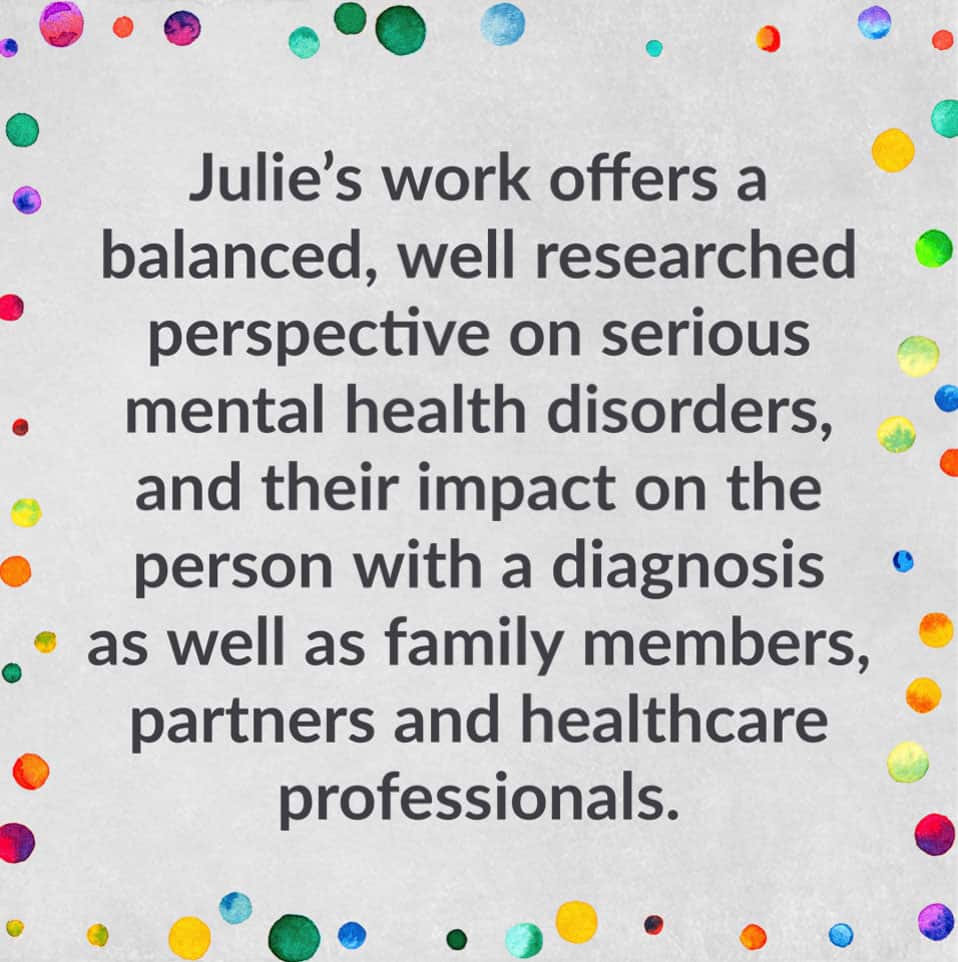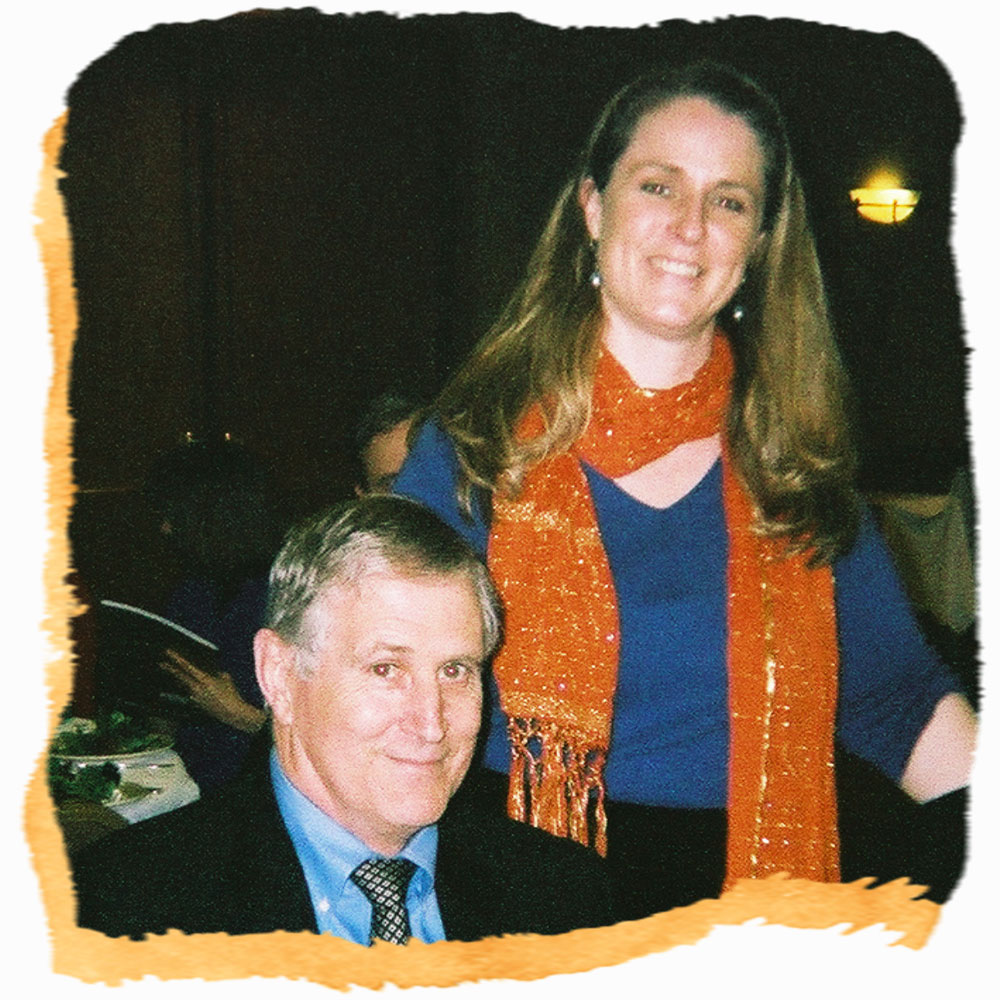
ABOUT Julie A. Fast
Julie A. Fast is a world leading mental health expert on the topics of bipolar disorder, depression, anxiety and psychosis. She is the bestselling author of Loving Someone with Bipolar Disorder: Understanding and Helping Your Partner, Take Charge of Bipolar Disorder: A Four Step Plan for You and Your Loved Ones to Manage the Illness and Creating Lasting Stability and Getting it Done When You’re Depressed: 50 Strategies for Keeping Your Life on Track.
Julie is the top bipolar disorder management writer in the world with over 500,000 books sold and 15 million views of her online work for bp Magazine, Psychology Today and other publications. Julie lives with bipolar disorder and a psychotic disorder. Her official diagnosis is schizoaffective disorder, bipolar type. She is the third generation in her family to have bipolar disorder. She was in a long term relationship with a partner who has bipolar one.
Julie’s unique experience as a person who lives with bipolar disorder and a psychotic disorder and her long term relationship with a person who has bipolar gives her a unique view of the needs of those with the illnesses as well as those who care about someone with mood swings and psychosis.
Julie does her own rigorous research and regularly trains healthcare professionals including general practitioners, social workers, therapists, natural practitioners and psychiatric professionals. Her work is widely used in clinical settings.

Julie's
Current Work


Julie’s latest research focuses on the impact of substances on the bipolar and psychotic disorder brain including cannabis marijuana. She shares this research in the Bipolar Significant Seven chapter of the second edition of Take Charge of Bipolar Disorder.
Julie’s work offers a balanced, well researched perspective on serious mental health disorders and their impact on the person with the diagnosis as well as family members and partners.
Julie’s interests include the impact of substances on the brain, repairing relationships affected by brain illnesses, how bipolar and psychosis symptoms impact the eyes and how to prevent bipolar and psychotic disorders in the next generation.
Julie was the original consultant on the Showtime production Homeland starring Claire Danes and is a regular contributor to media sources on the topic of brain health.
You can find all of Julie’s books here.
My Work in
Mental Health Courts and the General Court System In the early 2000s
I had the incredible fortune to become friends with Judge Robert Selander, a trailblazer who established the first mental health court in Oregon. He took me under his wing as one of the first mentors in my career, shaping my understanding of the legal system’s intersection with mental health.
I had the privilege of sitting in on his court proceedings, followed by in-depth discussions over lunch about the state of our mental health system. As a former district attorney, he provided invaluable insights into the U.S. court system, knowledge that continues to guide my work today. Experiencing the court system from multiple perspectives—first as a partner of someone navigating commitment and guardianship proceedings, and later as a professional supporting families and individuals in court—has given me a unique lens through which to help my clients. I realize I don’t often talk about my professional training, but I’ve been fortunate to learn from exceptional mentors.

Judge Selander and I in the early 2000s

Judge Robert Selander
Pioneer in mental health and substance use courts.

Dr. John Preston
Expert in psychopharmacology. My coauthor on three books. John trained me for 15 years in the topics of medications, bipolar disorder research, clinical skills and compassion for those with brain illnesses. John helped me hone my diagnostic skills so that I can now help my clients get a robust and correct diagnosis for their loved ones. John died of cancer in 2020. He was my friend, colleague, doctor and support.

Dr. Jim Phelps
Specialist in bipolar spectrum disorders. Dr. Phelps wrote the introduction to Take Charge of Bipolar Disorder and verified my research in the Bipolar Significant Seven chapter. He is a brilliant and generous man.

Dr. Jay Carter
Renowned author on mental health with an emphasis on bipolar and schizoaffective disorder. I wrote the partners chapter in his bipolar disorder book. Dr. Carter verified my research in the Bipolar Significant Seven chapter in Take Charge of Bipolar Disorder.
Dr. Carter worked in women’s prisons and taught me a great deal about this work. I took many of his trainings as he traveled across the United States teaching about the brain. Their groundbreaking contributions have transformed our understanding of bipolar disorder and psychotic conditions. I’m aware that having them as mentors shaped my work to what it is today.

My Court Work & Expertise ⚖️🧠
In my work with clients navigating the court system, I’m considered an ‘expert by experience’—a designation for individuals qualified as experts through knowledge, skill, experience, training, or education. Much of my expertise was shaped through invaluable mentorships with brilliant legal and mental health professionals.
My specialty is creating documentation that lawyers use in court cases that have a bipolar and/or psychotic disorder component. While I don’t appear in court due to the impact it has on my bipolar disorder, I work closely with my clients’ lawyers to provide strategic guidance and support.
I often consider pursuing a master’s or PhD, but due to lasting physical health challenges from a serious biking accident in 2012 🚴♀️💥, this remains more of a goal than a current possibility.

Gratitude & Mentorship 🙏
Starting my career before social media allowed me to build deep, in person connections with professionals dedicated to mentorship and education. While much of this networking has since shifted online, I’m profoundly grateful to have entered the field in 2002, when face to face learning with brilliant minds was the norm. I owe so much to these exceptionally generous educators, and I remain deeply thankful for their guidance.
If you’re searching for trusted resources on bipolar disorder, I highly recommend their work.
Get
Social


